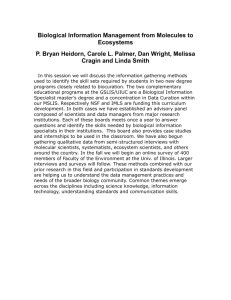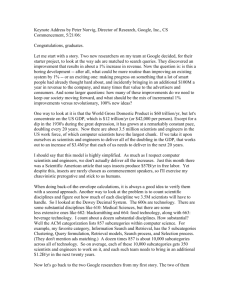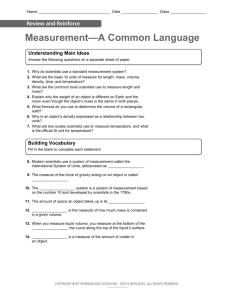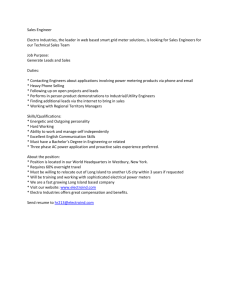Foreign-born scientists have come and stayed in large numbers
advertisement
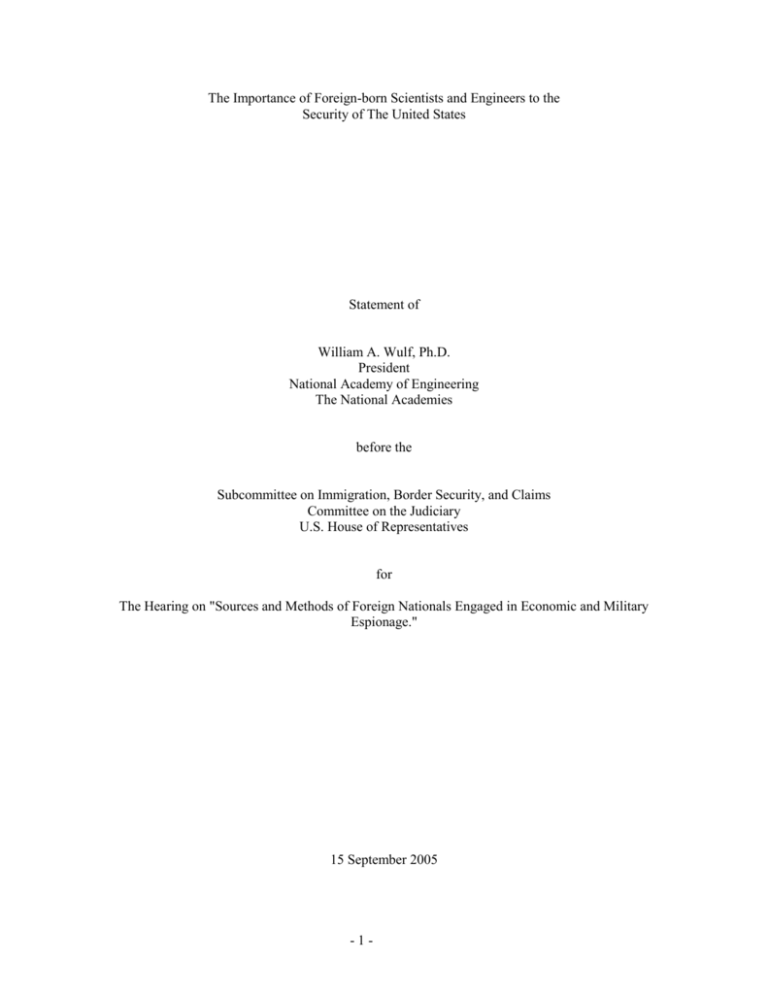
The Importance of Foreign-born Scientists and Engineers to the Security of The United States Statement of William A. Wulf, Ph.D. President National Academy of Engineering The National Academies before the Subcommittee on Immigration, Border Security, and Claims Committee on the Judiciary U.S. House of Representatives for The Hearing on "Sources and Methods of Foreign Nationals Engaged in Economic and Military Espionage." 15 September 2005 -1- Good afternoon, Mr. Chairman and members of the Committee. My name is William Wulf and I am on leave from the University of Virginia to serve as President of the National Academy of Engineering (NAE). Founded in 1964, the NAE provides engineering leadership in service to the nation. It operates under the same congressional act of incorporation that established the National Academy of Sciences, signed in 1863 by President Lincoln. Under this charter the NAE is directed "whenever called upon by any department or agency of the government, to investigate, examine, experiment, and report upon any subject of science or art [technology].” I am pleased to come to this hearing today to remind all members of the committee of the important contributions foreign-born scholars, scientists, and engineers have made and continue to make to this country. Foreign-born scientists and engineers have come to the United States, stayed in large numbers, and we are more prosperous and more secure, in large part, because of them! Before proceeding, perhaps I should note that national security is not an unfamiliar subject to me. I have carried a TS/SCI clearance for decades, have been a member of the Air Force Science Advisory Board (AFSAB), and an advisor to DoD on many subjects. When I founded a company in the early 80’s, it was based on DoD funded university research, and our principal product was defense-related software. My wife carries more clearances than I, was also an member of the AFSAB, has been a member of the Defense Science Board (DSB) for two decades – except for five years when she served in the Pentagon as the Director of Defense Research and Engineering. I believe it is fair to say that both my wife and I are not only sensitive to national security issues, but for decades have devoted our energies to it. We understand the need to protect certain information, and we value the people who provide us that security and would do nothing that jeopardized them or their mission. Although I probably don’t need to say it to the committee, I want to stress the centrality of our technological prowess to our security. It is said that success has many parents – one example of this -2- is the many explanations for why we won the cold war. One component of that victory however, was that the Warsaw Pact was never tempted to start a conventional (non nuclear) war even though they had a significant numerical advantage in both troops and armament. The reason was that we offset their numerical advantage with superior technology. Our troops could locate, identify, target and destroy a potential attacker with far greater accuracy, speed, and lethality. MAD (Mutually Assured Destruction) may have prevented a nuclear war, but our “offset strategy” using superior technology was a major component of preventing a conventional one. It is for this very reason that I am convinced that security – real security – comes from a proper balance of keeping out those that would do us harm and welcoming those that will do us good. Throughout the last century, our great successes in creating both wealth and military ascendancy have been due in large part to the fact that we welcomed the best scientists and engineers from all over the world. No other country did that, and nowhere else has the genius for discovery and innovation flourished in the way it has here. I am deeply concerned that our policy reactions to 9/11 have tipped that balance in a way that is not in the long term interests of the nation’s security. Fifty years ago many of our scientific leaders came from Europe. There are the famous names like Einstein, Fermi, and Teller (without whom we might not have been the first to build the atomic bomb), von Braun (without whom we would not be ascendant in rockets and space), and von Neumann (without whom we might not be leaders in computing and information technology). But there are dozens more names, like Bethe and Gödel, that may not be known to the general public, but that formed the backbone of American science and engineering – plus an enormous number of journeymen scientists and engineers whose individual contributions will never be celebrated, but without whom the United States would be neither as prosperous nor as secure as it is. -3- Today, it isn’t just Europeans that contribute to our prosperity and security; the names are like those of Praveen Chaudhary (now director of Brookhaven National Lab), Venkatesh Narayanamurti (dean of the Division of Engineering and Applied Sciences at Harvard), C.N. Yang, (Nobel Laureate physicist, from the Institute for Advanced Study in Princeton), Katepalli Sreenivasan, (recent director of the Institute for Physical Science and Technology at the University of Maryland); and Elias Zerhouni (who was born in Algeria and now is the director of the National Institutes of Health). Between 1980 and 2000, the percentage of Ph.D. scientists and engineers employed in the United States who were born abroad has increased from 24% to 37%. The current percentage of Ph.D. physicists is about 45%; for engineers, the figure is over 50%. One fourth of the engineering faculty members at U.S. universities were born abroad. Between 1990 and 2004, over one third of Nobel Prizes in the United States were awarded to foreign-born scientists. One third of all U.S. Ph.D.s in science and engineering are now awarded to foreign born graduate students. We have been skimming the best and brightest minds from across the globe, and prospering because of it; we need these new Americans even more now as other countries become more technologically capable. Top-notch students and teachers from abroad help make U.S. colleges and universities global centers of excellence and diversity. Highly skilled workers and world-class business leaders who come to work with or for U.S.-based companies help keep our economy growing – an amazing fraction of new Silicon Valley start-up companies are headed by individuals born abroad, for example. It’s a mistake to think that all important defense technologies originate in the United States and hence that the problem is simply how to keep our technology from being stolen by others. We talk proudly about the role of MIT’s “Rad Lab” in developing radar in WW II – but the crucial technology came from the United Kingdom. At the end of WW II the United States was a distant third in the development of jet engines, behind Germany and the Soviet Union. The World Wide Web was invented at the European -4- Organization for Nuclear Research (CERN) located in Switzerland -- not in the United States. Again, real security depends on a careful balance – in this case a balance of openness and secrecy. Walling ourselves off from the otherwise open international exchange of basic scientific information is a recipe for being surprised and disadvantaged. To be sure, 9/11 and globalization have changed the balance point. There is good reason to fundamentally rethink our policies. However, several recent policy changes, related to visas, treatment of international visitors, deemed exports, and so on, have had a chilling effect. Enrollment of international students in U.S. colleges and universities has declined. Scientists have chosen to hold conferences in other countries. U.S. businesses have had to shift critical meetings to locations outside this country. In the meantime, foreign companies, universities and governments are marketing themselves as friendlier places to do business or get an education. In the race to attract top international talent, we are losing ground. In 1960, none of the present constraints would have had much effect on the flow of outstanding scientists into our country. We were scientifically the most vibrant place in the world, and the best people were willing to make great efforts to come here. That is no longer the case. After WW II, the U.S. forged a mutually reinforcing triad of complementary R&D strengths in industry, academia and government. However, U.S. industrial laboratories have greatly reduced their support for long-term basic research; and many U.S. corporations are shifting research and development to overseas locations—not just because foreign labor is cheaper, as is the common and comfortable myth, but because it is of higher quality! U.S. government laboratories are in various states of disarray, and no longer maintain the stature that they did in 1960’s. Government support for the physical sciences and engineering at universities has declined in real terms, and is suffering further under present budget pressures – clearly, a strong research capability is not a current federal priority. Enrollment in the physical sciences and engineering, as a percentage of undergraduates, is among the lowest in the -5- industrialized world – the U.S. now graduates just 7% of the world’s engineers, for example. Given that our 12th graders score among the lowest in the world in science and mathematics, the ranks of U.S. born scientists and engineers are not likely to expand dramatically anytime soon. Our once strong triad of R&D capabilities is crumbling. At the same time, science and technology are growing rapidly in other parts of the world. Over 70% of the papers published in the American Physical Society’s world leading journals, The Physical Review and Physical Review Letters, now come from abroad. As is illustrated in the second figure below, the number of first degrees in science and engineering awarded per year in Asia (most importantly China) is now almost three times greater than in North America. It is even somewhat larger than in all of Europe. As said earlier, it’s a mistake to think that all important defense technologies originate in the United States and hence that the problem is simply how to keep our technology from being stolen by others. -6- For over 40 years, tens of thousands of individuals at a time have been working in our nation's nuclear weapons program. In that time, no leaks have been publicly proven. The fact that so many people – half of them scientists and engineers, and many of them foreign born – can be trusted with such secrets speaks volumes about the effectiveness of a "culture of openness" in dissuading opportunistic individuals from acting. This culture of openness is characteristic of research laboratories. It means that we talk freely on most things, keeping only very specific controlled information to ourselves. This culture leads to everyone knowing everyone's business, a very effective barrier to unusual or unseemly behavior. This culture is effective in a way that a "culture of secrecy" is not. Most espionage convictions are for individuals working in security agencies, in fact. -7- Export Controls Export controls were first instituted in the United States in 1949 to keep weapons technology out of the hands of potential adversaries, but have also been used as an economic tool against our competitors. The export of controlled technology requires an “export license” from either the U.S. Department of Commerce or State. In addition, since 1994 the disclosure of information about a controlled technology to certain foreign nationals (even in the United States) has been “deemed” to be the export of the technology itself. Thus, disclosure also requires an export license. Reports of the inspectors general (IGs) of the U.S. Departments of Commerce, Defense, and State have suggested that the implementation of the rules governing deemed exports be tightened further. For example, they have suggested that the exemption for basic research be altered, and possibly eliminated, and that the definition of “access” to controlled technology be broadened. Again, the real security of the nation depends upon a proper balance. The university community is rightly concerned that a literal interpretation of the IGs’ suggestions would essentially preclude foreign graduate students from participating in research and would require an impossibly complex system to enforce. Further, strict enforcement would undermine the culture that has proven so effective in furthering our security and prosperity. Given that 55 percent of the Ph.D. students in engineering in the United States are foreign born, the effect could be catastrophic. Either universities would have to eliminate these students, most of whom historically stayed and contributed to our prosperity and security, or universities would have to stop doing research on potentially defense-related issues – which, of course, includes much of the fastest moving hi-tech technologies. Neither of these alternatives strengthens the United States; both weaken it. -8- One might ask if these policy changes will improve our security. I would point out that the United States is not the only research-capable country; China and India, for example, have recognized the value of research universities to their economic development and are investing heavily in them. By putting up barriers to the exchange of information about basic research, we wall ourselves off from the results in these countries and slow our own progress. At the same time, the information we are “protecting” is often readily available from other sources. Finally, in a country with an estimated ten million illegal aliens, one must wonder whether onerous visa policies or demeaning practices at boarder crossings will deter the committed, trained spy or terrorist from entering. We do have important natural advantages. The 2001 Hart-Rudman Commission, which in February of 2001 predicted a catastrophic terrorist attack on the U.S., and which then proposed the Department of Homeland Security, said: “… the inadequacies of our system of research and education pose a greater threat to U.S. national security over the next quarter century than any potential conventional war that we might imagine.” The report was written before 9/11; had it been written afterwards, I am sure “conventional war” at the end of the quote would have been changed to include our struggle against terrorism. The essential point, however, is that further damaging our system of research and education, including its relation to foreignborn scholars, is a very dangerous strategy. The United States still benefits from educating and employing a large fraction of the world’s best scientists and engineers. We have great research universities that remain attractive to the world’s best and brightest. We are envied for our non-hierarchical tradition that allows young scientists, with new ideas, to play leading roles in research. We have progressed because we fostered a tradition of free exchange of -9- ideas and information and embraced a tradition of welcoming talented people from elsewhere in the world. But our advantage is eroding under current and proposed policies. The international image of the United States has been one of a welcoming “land of opportunity”; we are in the process, however, of destroying that image and replacing it with one of a xenophobic, hostile nation. We are in the process of making it more likely that the world’s “best and brightest” will take their talents elsewhere. The policies that superficially appear to make us more secure are, in fact, having precisely the opposite effect. Protecting Americans from threats must obviously be a high priority. But, as I said earlier, real security will be achieved only by a proper balance of excluding those that would harm us and welcoming those that would do us good, by a proper balance of openness and secrecy. With selected, thoughtful changes to U.S. policies, we can achieve both goals, making our homeland safer and our economy stronger. I would like to close with another quote from the Hart-Rudman report: "Second only to a weapon of mass destruction detonating in an American city, we can think of nothing more dangerous than a failure to manage properly science, technology, and education for the common good over the next quarter century." Thank you for the opportunity to testify. I would be pleased to answer any questions the Subcommittee might have. - 10 -



